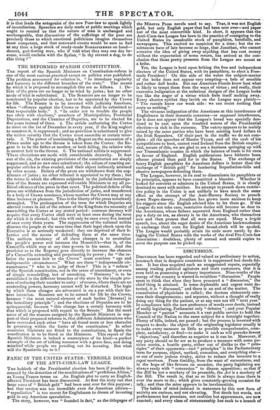PANIC IN THE UNITED STATES: TERRIBLE DOINGS OF THE ANTI-CORN-LAW
LEAGUE.
THE hubbub of the Presidential election has been if possible in- creased by the detection of the machinations of "perfidious Albion," as Young France terms us. An English plot to carry an English- affected President has been discovered. At first the story ran that large sums of " British gold" had been sent over for this purpose ; but that version was too incredible even for American editors- " repudiation " is too recent for Englishmen to dream of investing gold in any American speculation.
The story, however, was "founded in fact," as the titlepages of the Minerva Press novels used to say. True, it was not English - gold, but only English paper that had been sent over—and paper not of the most convertible kind. In short, it appears that the Anti-Corn-law League has been in the practice of consigning to the United States its unsaleable stock of pamphlets, handbills, and newspapers. This excited no suspicion for a time; but the re- mittances have of late become so large, that Jonathan, who cannot conceive the idea of giving away anything that has cost money without the expectation of some return, has arrived at the con- elusion that those pretty presents from the League are meant as a bribe.
Yes, the League is bent upon bribing the free and independent electors of the United States, with its pamphlets, to elect a Free- trade President! On this side of the water the subject-matter of the bribe does not appear very tempting—a bale of sensible and rather dull books. But our American friends know best what is likely to tempt them from the ways of virtue ; and really, their excessive indignation at the nefarious designs of the League looks too like the anger of a virtue which feels itself melting away. Every abusive epithet they lavish on the League says plainly- " The rascals know our weak side : we can resist nothing that costs us nothing."
The virtuous indignation of the Americans at this interference of Englishmen in their domestic concerns—or supposed interference, for it does not appear that the League's bread was specially des- tined to be cast upon the troubled waters of the Presidential election—is rich in the extreme. The outcry appears to be mainly raised by the same parties who have been sending hard dollars to the Irish Repealers. Of their part in the traffic we do not com- plain : all the speeches of Master TYLER, and all the cash of his sympathizers to boot, cannot rend Ireland from the British empire ; and, secure of this, we are glad to see a business springing up with our Transatlantic cousins in which the balance of trade is for once in favour of England. English publications have hitherto been oftener pirated than paid for in the States. The exchange of heavy English pamphlets for American dollars is better than the exchange of "British gold" for lumbering Repudiation-bills and abusive newspapers defending them. The League, however, in its zeal to disseminate its pamphlets or its principles, appears to have committed a blunder. Whether it looked for converts or admirers in the United States, it is clearly destined to meet with neither. Its attempt to preach down restric- tive policy in the Union is not unlikely to have much the same effect as the attempt of the Anti-Slavery Society to preach down Negro slavery. Jonathan has grown more anxious to keep his niggers since the English advised him to let them go. If the League do not take care, restrictive duties will become as dear to the Americans, whose fathers separated from England rather than pay a duty on tea, as slavery is to the Americans, who themselves now and then protest that all men are equal. Many a bright speech, too, about the eager desire of the American backwoodsmen to exchange their corn for English broad-cloth will be spoiled. The League would probably attain its ends more surely by de- luging the United States with the works of the rival Pro-Corn-law Association : doubtless, plenty of unread and unsold copies to serve the purpose can be picked up.


























 Previous page
Previous page